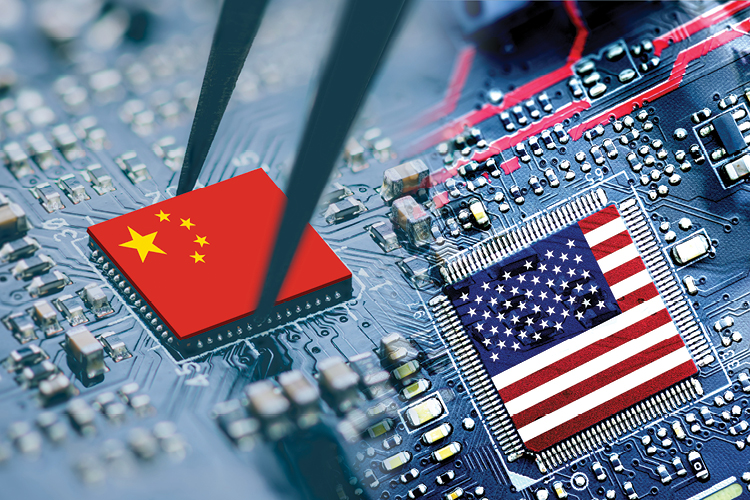The CHIPS Act could complicate things for lawyers with clients in China or Taiwan

Photo illustration by Sara Wadford / ABA Journal
Promoting the new Creating Helpful Incentives to Produce Semiconductors and Science Act of 2022, President Joe Biden’s administration boasts of $280 billion in “historic investments” in nanotechnology, quantum computing and artificial intelligence. Some $52 billion is earmarked for incentives to promote the onshoring of computer chipmaking.
“We invented the chip in America, then we got lazy,” Biden noted in late November at a site that illustrated the CHIPS Act’s aim: an expanded semiconductor manufacturing facility in Michigan owned by SK Siltron of South Korea. “Companies began to move jobs overseas instead of products overseas, because it was cheaper for them.”
Supporters of the new act hope to end U.S. reliance on chips manufactured in Asia, particularly Taiwan, which dominates the world market, producing an estimated 65% of the world’s semiconductors and almost 90% of advanced chips, according to Voice of America.
The motive is partly national security, a response to China’s current aggression in its region. “If China were to acquire control over Taiwan’s industry, proponents of the CHIPS Act argue, the United States would be at the mercy of a Chinese ‘monopoly’ that could extract exorbitant prices or cut off supplies for political reasons,” Alan Sykes, a professor at Stanford Law School, said in an August blog post.
The act provides direct subsidies plus tax incentives for the expansion of chipmaking facilities in the U.S.—subsidies that both American and foreign companies can access, subject to restrictions on expanding production to China.
That shifts the ground for lawyers with clients in Asia who “will have to make a business decision whether to accept the conditions attached to U.S. subsidies and perhaps forgo expansion abroad,” Sykes says. “Lawyers need to make sure clients are informed of the rules so that sound business decisions can be made.”
One potential side effect of the act includes amped-up patent litigation as the shift to manufacturing microchips domestically makes them further subject to U.S. intellectual property law.
Bijal Vakil, the global co-head of technology at Allen & Overy, forecasts more courtroom action. “We will definitely see an increase in overall patent battles involving chips because all chips made in the U.S., even for export, will be subject to U.S. damages awards,” he says.
That could increase legal costs and decrease profits, but the act’s net effect is likely to be positive because of the incentives it delivers.
“We’ll get our money’s worth as a nation because it will spawn industry growth,” Vakil says.
The Eastern front
The act is a major new battleground in what historian Chris Miller terms the “chip war,” the title of his 2022 book that identifies data as the new oil and processing power as the essential drilling equipment for its access. The fabs, or fabrication facilities, that make the chips are the new refineries.
“The act will have an impact, but the reality is that the chip industry is so dominated by China and South Korea and Taiwan that it won’t make us self-sufficient by any means,” Miller says. He notes that semiconductor giant Taiwan Semiconductor Manufacturing Co., a major Apple Inc. supplier and the world’s largest contract chipmaker, is building a $12 billion plant in Arizona. Even so, “most capacity will remain in Asia.” For lawyers, he predicts “there will be more work on the export control front.”
The fine print of the act is just one of the foreign relations nuances that lawyers will have to master as the U.S. confronts China’s market might and strategic power plays.
Major law firms are scrambling to notify clients that things are getting complicated.
“The U.S. has also recently imposed significant export controls on China relating to advanced semiconductor technology and supercomputers. These rules are extremely complex and carry heavy penalties for violations. So all lawyers dealing in this sector and China need to be very cautious,” says Judith Alison Lee, a co-chair of Gibson, Dunn & Crutcher’s international trade practice group.
The client alert Lee helped draft in October runs 12 pages of technical interpretation and analysis of changes to the Export Administration Regulations by the Commerce Department’s Bureau of Industry and Security. They “will create an effective embargo against providing to China the technology, software, manufacturing equipment and commodities that are used to make certain advanced computing integrated circuits and supercomputers,” the alert says.
At Arnold & Porter, experts on legislative policy and international trade are looking ahead at the advice clients will need to negotiate the new offshore tech maze. One trend they say clients should watch is the move to shift manufacturing to countries with shared values.
“Pay attention to the administration’s rhetoric on friendshoring,” which is the practice of locating supply chain waypoints in countries unlikely to experience political disruption, because of the need to balance the CHIPS Act incentives with increased supply chain security goals involving allies and partners, advises Marne Marotta, a managing director and former U.S. Senate staff adviser on commerce and trade issues.
The impact of legal advice on CHIPS Act issues can be hard to evaluate because of its novelty.
“This is the first time that I’m aware of that the federal government has conditioned an incentive program on recipients agreeing not to do something in another country,” Marotta says. If it succeeds in discouraging semiconductor manufacturing in China, “internationally, I could see other countries adopting incentive programs with similar restrictions, which would drastically alter the semiconductor supply chain.”
This story was originally published in the April-May 2023 issue of the ABA Journal under the headline: “Playing Their CHIPS: The CHIPS Act could complicate things for lawyers with clients in China or Taiwan.”



